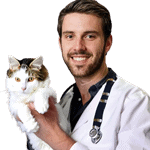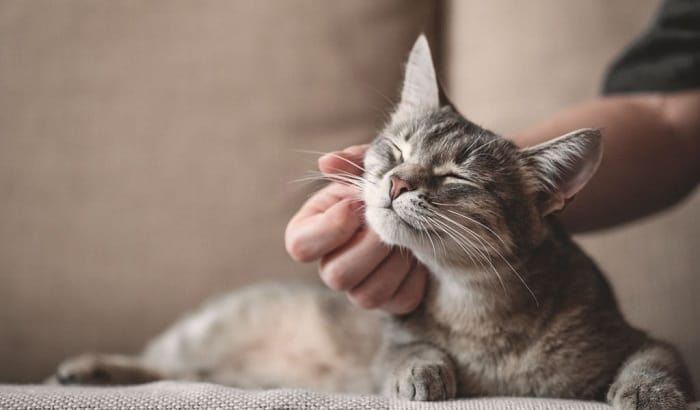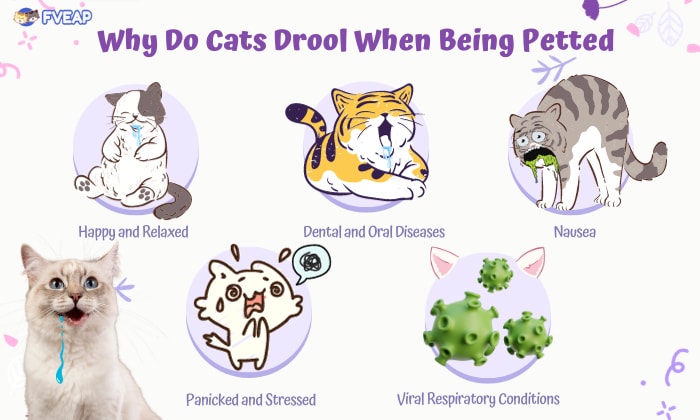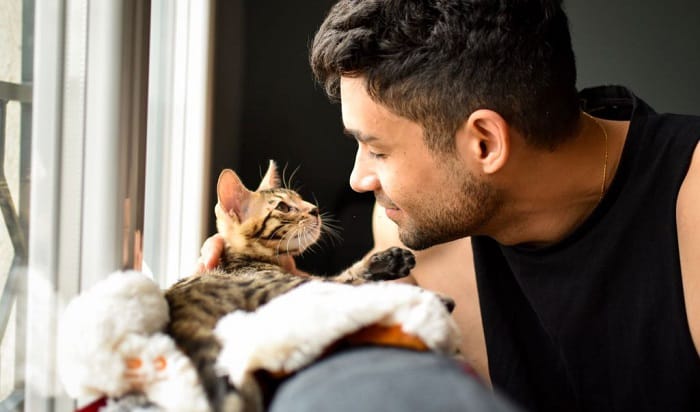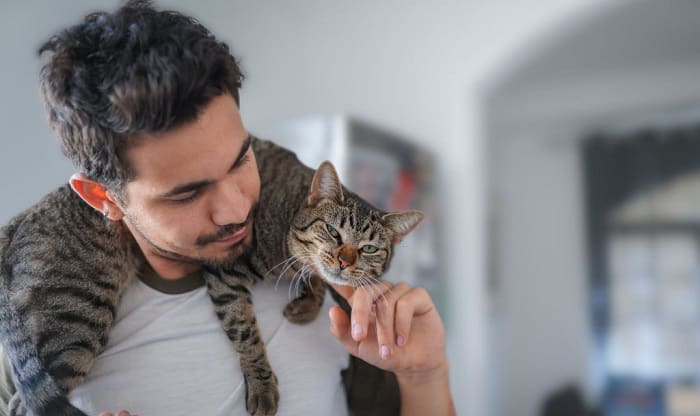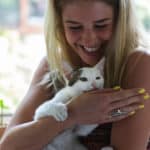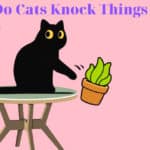Drooling in cats can be caused by several different things. Assessing the problem, getting to know your cat, and calling your veterinarian as required are crucial stages in figuring out your question, “why does my cat drool when I pet him?”
Table of Contents
Why Do Cats Drool When Being Petted
Contentment –If a cat drools when petted, it seems due to his contentment. Drooling can occur when cats are scared or disturbed, but it is more probable that they are drooling because they are comfortable.
Some cats drool when you pet them because they feel relaxed, sleeping, or enjoying your affection. It simply denotes a biological response to great pleasure or relaxation. Tiny kitten spittle after an excellent scratch might indicate an emotional or physiological response to a stimulus.
Fear drooling – When it comes to fear drooling, cats prone to motion sickness may also exhibit this habit. Drooling can also be a symptom of a health condition. Here are some of the common causes of your cat drooling when pet:
1. Your cat appears to be happy and relaxed.
Your cats drool when petted because she’s happy and relaxed by their favorite people. Pleasurable stimulation, such as stroking, can cause an over-salivation, resulting in dribbling. Furthermore, when a cat is comfortable and being stroked, all muscles in its body relax, even those holding its small lips closed. Consider how some people dribble when sleeping when our bodies are at their most relaxed.
There are a few more signs to look for if you’re not sure if the cat is drooling when feeling happy. You know you have a happy cat if you observe any of these things in addition to petting, drooling, and purring. Here are a few of the signs:
- Kneading: When your cat is loving and pleased, they knead their paws repeatedly, a behavior known as “baking cookies.” They used to massage their mothers’ breasts as kittens to stimulate milk production, thus kneading is a clear sign of affection and loyalty. But if your cat only kneads you but not anyone else, here is the reason why!
- Body Language: The eyes, ears, tail, and body position of your cat may indicate a lot about their mood. Happy cats blink slowly and waggle their seat from side to side often. Their body will be in a relaxed state. Sometimes, they also stick their tongue out when petted.
- Furthermore, when you scratch the base of a cat’s tail, they lift their rear in the air as though they’re having a wonderful time, indicating that you’ve found the sweet spot!
- Head Butting: When you touch a joyful kitty, they may regularly headbutt you or thrust your palm with their face. That is their way of indicating they’re having a good time and don’t want it to end! You also can check this post to know why your cat headbutts you!
2. Dental and Oral Diseases
Dental disease in cats is widespread and may go undiagnosed until they cause severe sickness or discomfort. When a cat is in pain, it generates a lot of saliva. Mouth ulcers, tooth trauma, gum disease, genital injury, and infection can induce cat drooling. Although it is far less frequent than dental problems, some kitties can develop oral cancer, making cats drool when being petted.
Your veterinarian will look for signs of dental issues in your cat’s mouth. If dental disease is discovered, your vet will most likely recommend a professional cleaning and, if necessary, extraction. This procedure necessitates general anesthesia.
3. Nausea
Cats drool a lot when they’re unwell or vomiting. Internal parasites, renal illness, and gastrointestinal issues are all reasons for your pets to vomit. If they appear ill, vomit, or have a loss of appetite, you should take them to the doctor.
Your veterinarian may request lab testing to understand better organ function, blood cells, and urine composition after the examination. The findings may one day aid doctors in better diagnosing and treating patients.
4. Your Cat Is Panicked and Stressed
Another common reason for excessive drooling and salivation in cats is tension and stress, which often promotes the appearance or aggravates the symptoms of various diseases by weakening the animal’s immune system.
Stressed cats are more aggressive or energetic, and they are more prone to developing obsessive habits. Environments and situations of high stress can also impact their appetite and digestive processes. You should know what to do if your pet is stressed in these situations.
Recognizing the indications of stress and anxiety will assist you in better understanding how your pet is feeling. Increased vocalization, more timid or aggressive behavior, and the occasional drooling are notable signs.
They may also breathe via their lips when they are excited. If you notice any symptoms, attempt to find the source of stress as quickly as possible, contact your vet immediately to discuss possible tests and treatments.
5. Viral Respiratory Conditions
Another reason for cat drool is viral respiratory infections, leading to ulcerations in the cat’s mouth. Excessive drool is a common side effect of many respiratory problems.
A foreign body might cause the kitten to drool. If the cats ingested an errant blade of grass, a small fishbone, or a piece of a metal paper clip that became trapped in their mouth, the drool might be their attempt to “wash it out.” Cat drool can also result from a foreign body lodged in the cat’s stomach or esophagus and the animal’s attempts to vomit it out.
Why Does the Cat Drool at All
In many animals, including humans, drool is a regular occurrence. After all, drool is simply saliva, a digestive liquid that flows from our salivary glands and collects in our mouth.
Drool occurs when saliva accumulates to the point that it begins to flow or leak out of an open mouth. Individuals typically experience this after taking too much novocaine or during sleeping. On the other hand, dogs and cats are not the same.
Due to heredity and having four pairs of salivary glands, several dog breeds are prone to drooling. In contrast, Cats have five salivary glands, albeit they don’t drool nearly as much as dogs.
A tiny amount of drool is typical of a cat. Excessive drooling, on the other hand, might signal that something is wrong. Emotional impulses, irritations in the cat’s body that the cat seeks to wash away, or a pathologic condition like inflammation, pain, or trouble swallowing might all be factors. In any of these instances, it’s best to visit your vet.
Conclusion
Why does my cat drool when I pet him? Hopefully, you already have a good answer and stop worrying so much as you know how to deal with such a physiologic response.
In conclusion, other than emotional stimuli, reasons for many cats drooling include dental disease, fear, or a health problem. The majority of drooling is infrequent and contains only a tiny amount of saliva. In case of excessive salivation, it’s time to get him checked out by a veterinarian.
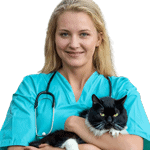
I am Amy Sawy, a Doctor of Veterinary Medicine (DVM) graduate from the University of Kansas. y husband, Dr. Plummer, and I own a veterinary clinic in Phillipsburg, Kansas. In addition to my professional background, I am a devoted pet owner myself, with a household that includes dogs, rodents, and most notably, cats – a total of five felines in my home.
In 2020, I joined an organization as a professional writer, leveraging my experience and collaborating with my team to deliver the most valuable information for your cat’s care.

